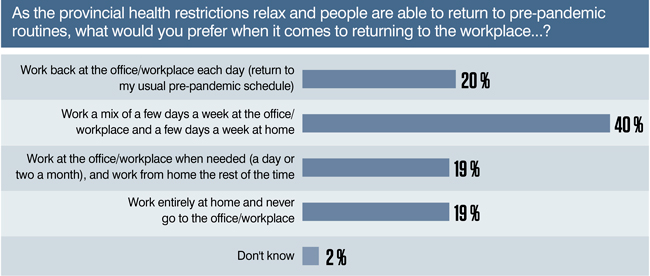 A May 2021 study from Leger reveals that for many Canadians working from home, the experience has been positive, and many are eyeing a hybrid mix of working from home and the office post-pandemic.
A May 2021 study from Leger reveals that for many Canadians working from home, the experience has been positive, and many are eyeing a hybrid mix of working from home and the office post-pandemic.
As many Canadians eagerly await their second vaccine dose, I am struck by how this once-in-a-lifetime pandemic will bring lasting and permanent change to our lives.
Canadian polling firm Leger, in collaboration with the Canadian Press, recently published the results of their Back to Work study, representing the feedback of 2,626 North American adults over age 18, including 1,624 Canadians. The online poll was conducted over the May long weekend, just as Canada was overtaking America in first-dose vaccinations.
As someone used to reading research studies, it is not often I am struck by a single statistic: among Canadians who worked/are still working from home during the pandemic, only 20 per cent express the desire to return to the office each day and resume their pre-pandemic routine, once health authorities deem it is safe.
For context, 31 per cent of respondents are living the work from home (WFH) experience; the balance are working in an office or non-home workplace (53 per cent).Interestingly, 16 per cent of respondents did not specify their work location—and it is reasonable to conclude the WFH split is at least a third of working-age Canadians, roughly 8 million folks across the country and a disproportionate number of vehicle owners.
Influential management professor Peter Drucker once remarked that the greatest danger in times of turbulence is not the turbulence, but to act with yesterday’s logic.
My surprise at the 20 per cent data point may be a reflection of my age and desire for predictability and routine (cue spousal eye roll). After three decades of commuting to the office, old habits die hard.
But the fact that nearly four in five working Canadians (78 per cent) express a preference to continue their WFH lifestyle in some fashion—from fully WFH to a hybrid mix to the occasional office visit when needed—challenges my assumptions about organizational life and what comes next. Only 2 per cent of respondents were unsure of their preference.
In retrospect, all of the news articles I’ve been reading about explosive growth in residential real estate markets this year, both in transaction volumes and average prices, were already pointing to this reality, as Canadians seek to adjust their homes and communities to optimize the WFH lifestyle.

Source: Leger and The Canadian Press, Back to Work Poll, May 31, 2021
Influential management professor Peter Drucker once remarked that the greatest danger in times of turbulence is not the turbulence, but to act with yesterday’s logic. In this spirit, I offer two takeaways from the Leger poll that will impact our industry:
1. The strong preference for WFH flexibility is evidence of a structural, not temporary, change in how we live and work.
Of those Canadians who worked/are working from home during the pandemic, an overwhelming majority (82 per cent) indicate the experience is positive (a combination of “very” and “somewhat” responses) and nearly two-thirds (64 per cent) feel the WFH experience is either very or somewhat easy.
Suburban dwellers are the most enthusiastic about WFH in comparison to their urban and rural counterparts, presumably because they gain back stressful commuting time. Cloud-based technology tools are proving their ability to enhance the quality of our lives, current levels of Zoom-fatigue notwithstanding.
WFH will dampen long-term vehicle demand and the need for maintenance service as annual kilometres driven decline. Demand for mobility-as-a-service (MaaS) and subscription services are expected to increase, especially from Canadians who no longer need to commute full-time, because the economics of pay-as-you-go mobility are favourable to the fixed costs of owning a depreciating and under-utilized asset (monthly payment, insurance, maintenance, parking and so on).
OEMs and dealers need to create and deliver new value to customers not tied to the private sale of a vehicle. Automotive finance veteran George Bauer, former CEO of both BMW and Mercedes-Benz auto finance subsidiaries, is forecasting that by 2025, 20 per cent of new and used vehicle sales will take the form of subscriptions.
According to Bauer, “subscriptions are today what leasing was 40 years ago… it’s clear [they] strongly resonate with today’s modern consumer, but they also benefit car dealers by expanding their market size through velocity.”
2. The preference of Canadians for WFH flexibility has implications for talent management and retention.
We are no longer restricted to the talent pool living within commuting distance of our business. While the opportunity to attract talent from afar is role dependent, for many knowledge-based positions, geography is no longer a barrier. The tech world has adopted this approach for years with great success—even continents are not barriers when it comes to software developers.
In the auto retail business, while it’s true certain roles like service technician and shop foreman can’t really be separated from the retail location, other roles including technology, accounting, marketing and business development are not bound by the same geographic restrictions. There are already North American dealer examples of digital sales team members being located in different cities.
Developing and retaining remote employees requires managers to deploy new leadership skills.
I have first-hand experience on the subject, having led remote teams across Latin America and Asia. There is not one magic formula to do this successfully, but setting clear performance standards and goals, scheduling regular touchpoints, and liberal use of instant messaging and video chat tools are essential ingredients.
Organizations need to be comfortable assessing employee performance and value on the basis of results delivered, not face time in the office. For automotive dealerships, already laser focused on measurable KPIs like appointments, deliveries, repair orders, and CSI, this transition should come more naturally.
Author Deepak Chopra presciently tweeted in 2018 that “all great changes are preceded by chaos.”
Author Deepak Chopra presciently tweeted in 2018 that “all great changes are preceded by chaos.” We’ve endured enough chaos and sadness over the last year and a half to last a lifetime. Let’s now embrace the positive changes this pandemic is bringing.
Innovate to prosper.
Darren Slind is Co-Founder and Managing Director, Clarify Group Inc. and a respected auto industry analyst. You can reach him at dslind@clarify.group











